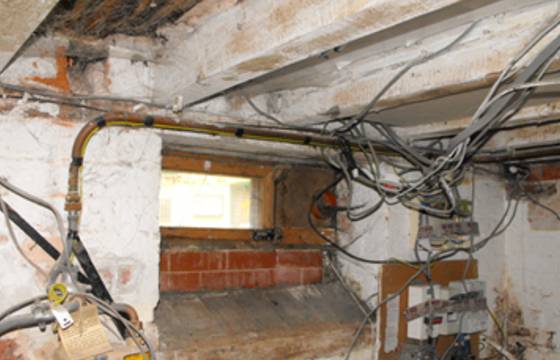
29 Sep, 2012/ by Surveyor Local /News
Safety warning: The Electrical Safety Council recommends that you should get a registered electrician to check the property and its electrical fittings at least every ten years, or on change of occupancy. All electrical installation work undertaken after 1 January 2005 should have appropriate certification. For more advice contact the Electrical Safety Council.
During a RICS Level 2 Survey on this property, the surveyor was able to gain access to the cellar to inspect the electric meter and distribution board. These had been isolated and turned off.
It was quite clear that the installation did not comply with current electrical standards and was, in the surveyor's opinion, unsafe. The system was in urgent need of a full inspection by an NICEIC (National Inspection Council for Electrical Installation Contracting) registered electrical contractor, or similarly qualified electrician. Their recommendations should then be implemented without delay.
Home surveyors are not qualified to inspect electrical systems in detail, and do not remove secured panels or undo electrical fittings, nor do they carry out specialist tests. Home buyers should be aware that a surveyor's visual inspection cannot assess the efficiency or safety of the electrical system.
In this case, the buyer required an outline estimate of the cost of remedial action. This was supplied as a budget estimate to rewire and refit the whole electrical installation (including obtaining a test certificates), coming to approximately £5,000, excluding VAT. Assuming the current owner did not carry out the urgent maintenance before the property was sold, this figure could be negotiated off the purchase price of the house, to account for the cost of the work.
Electrical lighting and power circuits have an average life expectancy of 30 years, making the inspection of older properties prior to purchase vital. In practice, however, all home owners should have electrical installations inspected and tested regularly to protect their property from damage, and to avoid putting their family at risk. Guidance published by the Institution of Electrical Engineers recommends that electrical installations should be inspected and tested at least every 10 years, and when the occupiers of the property change. All electrical work carried out after 1 January 2005 should be recorded on an Electrical Installation Certificate, which you should expect to see when you buy a property.
